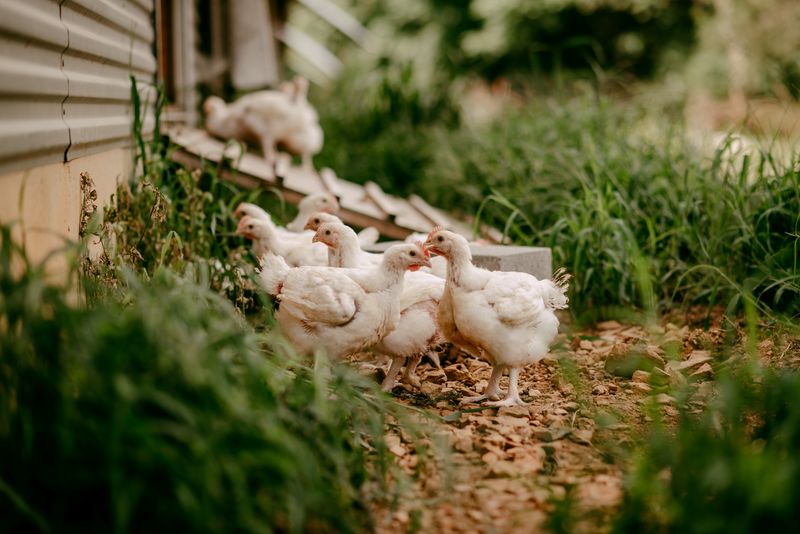By Tom Polansek
CHICAGO (Reuters) - U.S. prices for organic soybeans used to feed livestock and manufacture soy milk have surged to record highs as imports that make up most of the country's supply have declined, triggering price increases for food including organically raised chicken.
The costly soybeans and higher-priced organic products are fueling food inflation at a time consumers are eager to eat better and focus on health during the COVID-19 pandemic. The $56 billion U.S. organic food sector is also grappling with a shortage of shipping containers and a tight labor market as global food prices hit a 10-year high.
Food companies and chicken producers are experiencing bigger sticker shock from prices for organic soybeans, which are shipped in containers, than for the conventional crops shipped in bulk. Regular soy prices are around a seven-year high, rather than an all-time record.
Organic chicken producers are cutting corporate expenses to offset high feed costs and scrambling to source crops produced in the United States rather than abroad. The U.S. imports about 70% of its organic soybeans, according to industry estimates, and U.S. organic production has not increased enough to keep pace with growing demand.
Bell & Evans, a 127-year-old Pennsylvania-based chicken producer, feeds organic U.S. crops to 500,000 to 600,000 chickens each week and must compete for soybeans with other buyers that formerly relied on imports, owner Scott Sechler said. The company raised all chicken prices in July and will likely need to raise organic prices again, he said.
"We're in the most challenging time since the organic world started when it comes to feeding animals and selling an organic animal protein," Sechler said. "It's a madhouse now."
U.S. imports of organic soybeans from September 2020 through August 2021 fell by 18% to about 240,585 tonnes, according to U.S. Department of Agriculture data. Shipments sank by 30% from Argentina, the biggest supplier to the United States.
Imports from India fell by 34%, extending a pre-existing decline after the United States in January toughened its requirements to certify Indian crops as organic.
While the United States is the world's No. 2 exporter of conventional soybeans, farmers have been slower to embrace organics, put off by the steep initial investment and long conversion time to achieve organic certification. Now, with profits to be made from conventional farming amid low global soybean supplies, some growers said switching to organic is not worth the extra money and work.
"There's not enough in America to replace all the imported organic grain," Sechler said.
LOGJAMS
Shortages of container ships used to import organic crops and logjams at U.S. ports at a time of high consumer spending are sending the cost of transporting freight to record levels.
"The consumer goods market is paying premiums for whatever available containers they can find," said John Sheppard, president of U.S. organic soybean crusher Sheppard Grain. "Agricultural products just can't compete."
Prices for organic soybeans delivered in the U.S. Midwest in September reached about $33 per bushel, topping the previous record of about $25 per bushel from 2014-15, commodity data firm Mercaris said.
Organic feed prices, which account for 65% of the cost for raising a chicken, have climbed almost 20% in 2021, said Debarshi Sengupta, chief financial officer for chicken producer Farmer Focus. He projects they will be up nearly 40% by year's end if current price trends persist.
U.S. sales of organic food jumped by 12.8% last year to $56.5 billion, compared with a 4.6% increase in 2019, according to the Organic Trade Association. In 2020, organic accounted for 5.8% of food sales as the pandemic prompted consumers to eat more meals at home and focus on products perceived to be healthful, the industry group said.
Chicken producer Perdue Farms expects customers to see higher prices partly because of increased organic feed costs and is seeking to strengthen its domestic organic grain supply to prevent future price swings, said spokeswoman Andrea Staub.
Food companies and feed users are negotiating to buy organic U.S. soybeans at high prices from this year's autumn crop to last until next year's harvest. Domestic supplies will remain limited, handlers said.
U.S. farmers harvested about 170,074 acres of organic soybeans in 2019, up 37% from 2016, according to the USDA. The total soybean harvest, which is mostly genetically modified, covers 86.4 million acres this year.
Farmers must grow crops for three years without using prohibited substances, such as genetically modified seeds and synthetic pesticides, in order to be certified as fully organic.
"It's not an industry that can turn a switch overnight," said Nicole Atchison, chief executive of ingredient supplier PURIS Holdings, which buys organic U.S. soybeans.
